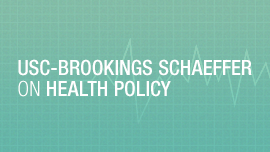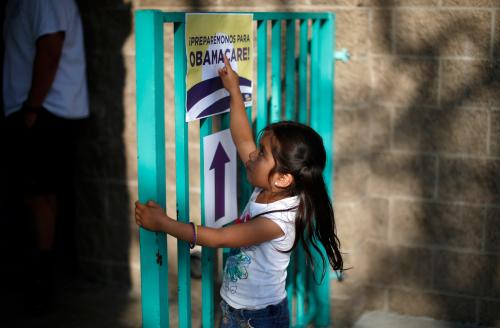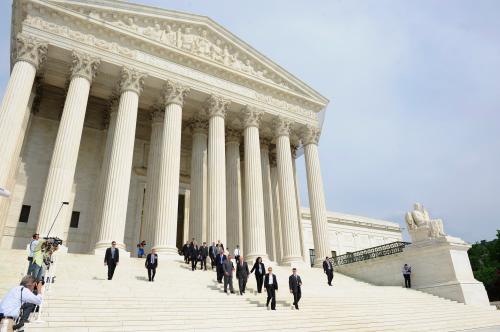Editor’s note: this post originally appeared in JAMA Forum on April 28, 2015. To view the original post, click here.
The Affordable Care Act (ACA) continues on its painful journey. Major technical problems remain in the statute, such as the “family glitch,” in which lower-income workers are offered employer coverage but their families are not and are also ineligible for exchange subsidies.
The congressional leadership wants to repeal the ACA rather than fix it, but lacks the votes to override a veto. Many Republican states have refused to implement the ACA’s Medicaid expansion. And in the pending King v Burwell case, the US Supreme Court could strike down subsidies in federal exchanges, leading to chaotic gridlock.
But a provision of the ACA is now attracting attention as a way out of this mess. It provides not only what is essentially an exit strategy for Republican states but also, paradoxically, a way for supporters of the ACA to preserve the law.
The Opportunity for States
Section 1332 of the ACA, known as “State Innovation Waivers,” allows states, starting in 2017, to apply to the federal government for 5-year renewable waivers from key provisions of the legislation. For instance, states could request changes to or exemptions from the individual and employers mandate, the market exchanges, the exchange subsidies, the Essential Health Benefits requirements, and other provisions. Moreover, states can combine waivers from ACA provisions with waivers from Medicaid provisions (so-called 1115 waivers), Medicare, the state Children’s Health Insurance Program, and waivers available through “any other Federal law relating to the provision of health care items or services.”
The opportunity for states to transform the ACA within their borders is breathtaking. It’s little wonder that a former top aide to the late Senator Edward Kennedy describes Section 1332 as “state innovation on steroids.”
Section 1332, however, is not a blank check for states to ignore the whole intent of the ACA, even assuming the White House or the next administration were open to that. It has important fine print. To obtain a waiver, a state’s proposal must retain important protections, such as guaranteeing that health plans accept an applicant regardless of their health status or other factor. The proposal’s coverage must be “at least as comprehensive” and cover “at least a comparable number of its residents” as the ACA, and insurance must be as affordable. Any state plan must also be budget neutral for the federal government.
Even with these limitations on state plans, section 1332 could lead to state health plans in the future that change the ACA beyond recognition. A Republican state like Arkansas, Utah, or Texas, for instance, could use the section to take the federal money for Medicaid expansion as a block grant and turn it into subsidies for families to buy private coverage. These or other states could also end the mandates on individuals and employers, perhaps using government-encouraged auto-enrollment for insurance to meet the ACA’s coverage projections. Meanwhile, states like Vermont, Oregon, and Hawaii could design waivers to create a form of single-payer health system.
Room for Maneuvering
The so-called guardrails associated with section 1332 could also be looser than they seem. For instance, since the US Supreme Court in 2012 struck down the requirement on states to expand Medicaid, the “comparable number” waiver stipulation for coverage in a nonexpansion state like Texas is much less onerous for the state.
In addition, the definition of federal budget neutrality could get rather metaphysical, depending on how baseline is defined—in other words, the amount of federal spending that would occur in the future without a 1332 waiver. Again, for a state like Texas or Florida, the baseline could be calculated only on the basis of projected exchange plan subsidy costs (because these states have not expanded Medicaid). But if such states declared that in principle they want to expand coverage to the Medicaid-eligible population, albeit in another way, then the baseline could include the extra projected spending. If so, nonexpansion states could propose a budget-neutral waiver that uses billions of “new” federal dollars to construct a market-based health plan.
The political ramifications of this wide flexibility under section 1332 are immense. For instance, Republican opponents of the ACA, recognizing that the foreseeable congressional makeup means outright repeal of the ACA is not feasible even if Republicans win the White House in 2016, would have a strategy for states to exit much of the ACA. Meanwhile liberals in other states would have a tool to move closer to their dream of a single-payer system. And the White House could claim that even in the Republican states with sweeping waivers, the ACA had been fully implemented. Moreover, the 1332 waivers would allow many of the technical problems of the ACA to be fixed at the state level without going to Congress.
A Solution for King v Burwell
If the Supreme Count decides in favor of the plaintiff in the King v Burwell case, striking down subsidies in states with federal exchanges, the ruling could also trigger a critical role for section 1332. Because 1332 does not even require exchanges and permits states to use the money for federal subsidies in quite different ways, it could be possible for states with federal exchanges today to finesse a King decision by using 1332. Republican states currently with federal exchanges could use the money for subsidies to empower residents to buy coverage in other ways. Democratic supporters of the ACA could redesign their exchanges or move in a different direction without needing to pursue legislation from Congress.
The wrinkle in this scenario right now is that section 1332 does not go into effect until 2017. But if the King v Burwell ruling results in millions of Americans losing affordable coverage, it would be the kind of crisis that produces a political deal in Congress. In return for agreeing to change the law to permit exchange subsides to continue at least temporarily in federal exchanges, Congress could insist on making 1332 take effect immediately and allow states to develop plans for waivers before a subsidy extension ends. It would be in the White House’s interest to agree to that. Republicans would avoid a potential backlash from physicians, hospitals, and newly uninsured constituents and allow many states effectively to take an exit ramp from the ACA.
The Republican Congress might also be able to force the White House to agree to changes in 1332 to make the Administration less able to block waivers, making the procedure less politically risky for Republicans. One way to do that would be to make certain types of waivers subject to automatic approval unless the Administration can show technical flaws. Another, as I proposed some years ago, would be for states to apply for fast-track congressional approval of waivers cleared by a federal-state commission.
With all these possibilities, it is little wonder that there’s growing interest in section 1332.
The Brookings Institution is committed to quality, independence, and impact.
We are supported by a diverse array of funders. In line with our values and policies, each Brookings publication represents the sole views of its author(s).











Commentary
Why Section 1332 could solve the Obamacare impasse
April 29, 2015